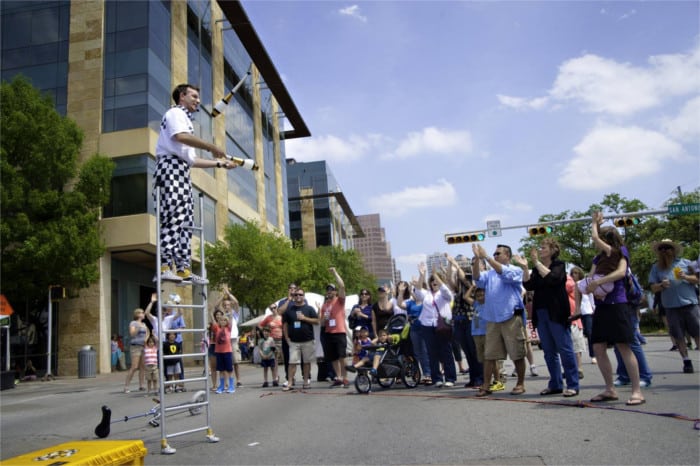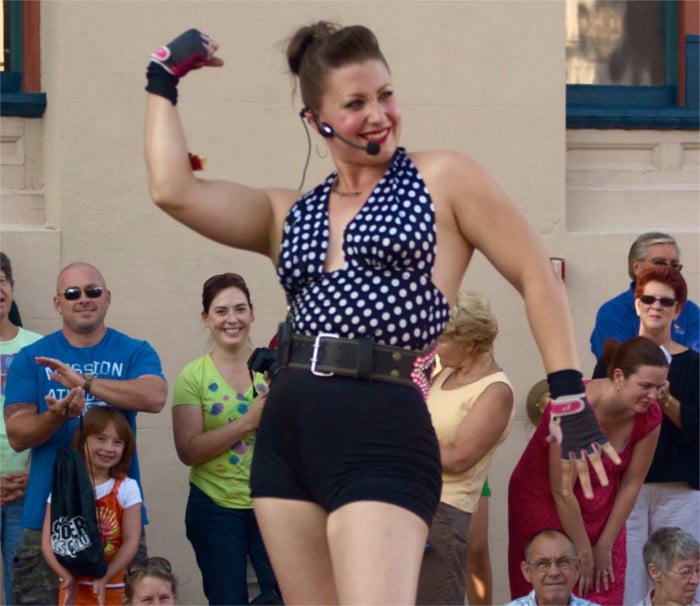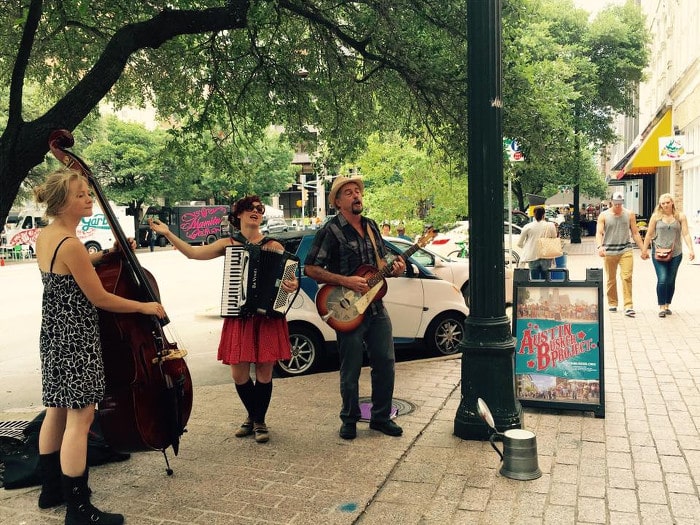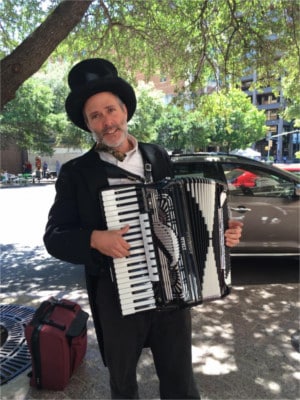
Credit: Austin Busker Project
Guest article by Jesselyn Parks
For those who find themselves on Austin’s famous Sixth Street on a weekend night, the sights and sounds of the city’s bustling nightlife radiate out in a familiar song. Cars and bikes zip through the streets, deep bass diffuses from lines of packed bars and, of course, a bucket drummer or two pulses rhythm into the supercharged atmosphere of “Dirty” or “West.”
However, when performers venture out to Austin’s streets, armed with their instrument, guitar case or bucket, many fear an encounter with police. Navigating the gray area of Austin’s city ordinances is tough, these buskers say, and many live in legal limbo. Unclear if they are operating under their First Amendment rights or simply waiting to be run off, street performers in Austin are forced to navigate swift waters. Even worse, according to buskers, the city is equally unsure of the law and benefits from keeping it that way.
Linsey Lindberg Is Voice for Street Performers

Linsey Lindberg, founder of Austin Busker Project (Credit: Austin Busker Project)
“The only people who end up [performing] on the street anymore are the people who don’t have anything to lose,” says Linsey “Mama Lou” Lindberg, performer and founder of Austin Busker Project. Although she’s a petite, “classic Hollywood” brunette, don’t let her looks fool you. She can easily bend a frying pan in half with her bare hands.
“The police chase people off with bad information,” she adds. “It’s a shame that the city has such a problem with panhandlers and the homeless, but because of the way they’ve written city code, they lumped together any kind of street performer or artist along with homeless people.” Lindberg has busked frequently in her past, and now hosts a highly successful traveling act showcasing her self-described “old fashioned feats of strength.” She also holds records in “The Guinness Book of World Records” for “Most Apples Crushed With The Bicep In One Minute” and “Most Telephone Directories Torn By A Female In One Minute.”
Enter: Austin Busker Project

Street performers raise awareness for Austin Busker Project (Credit: Austin Busker Project)
Lindberg founded Austin Busker Project upon arriving in Austin. After living in other thriving artistic cities around the country, she saw an opportunity to educate buskers and act as a liaison between artists and the city.
As an Austin newcomer, Lindberg performed her amazing “Strong Woman” act on the streets, much to the delight of locals and passersby. However, her encounters with law enforcement began to deter her from setting up shop. “I was run off by the cops, and directed to this permit that just didn’t exist,” she explains. “This wild goose chase of permitting, this is common.”
What Permit?

Do Austin’s street performers require a permit? The law is murky (Credit: Austin Busker Project)
Unfortunately, Lindberg is right–the law is foggy. And the notorious “required” permit? There is no evidence to suggest it actually exists. Despite several attempts from local organizations to revise, edit and even add to the existing city ordinance, roadblocks have negated these attempts. In 2014, five requested definitions and amendments fell through the agenda during the “10-1 changeover” that altered how the city council represents Austin. In the chaos and stress of this transition, passion to revise city ordinance dwindled.
First Amendment Rights in Question
According to Lindberg, it is actually in the city’s interest to keep the waters murky. The legality of busking permits is widely disputed, and court cases across the country overwhelmingly side with the rights of the performer. In the case Berger v. The City of Seattle, Berger, a local illusionist and balloon artist, filed suit against the city after he was required to obtain a permit in order to perform in a city park. The Ninth Circuit Court sided with Berger, deciding that the permitting system violated the protections of the First Amendment.
However, many cities and civilians insist these types of permitting systems are necessary for the safety and security of the public, as well as to protect local businesses and residential areas from unreasonable levels of noise. Many police officers also express concerns with the “right-of-way” to civilians, or simply the ability to safely pass through a public space like a sidewalk.
Thus, many local governments find themselves at an impasse: do they risk negating First Amendment rights by requiring a permit before publicly speaking or performing? Or do they put artistry and freedom of speech before all else, even if this means noise and complaints from residents and businesses?
This is why, Lindberg argues, it is in the city’s best interest to keep the law foggy and murky. As it stands, police officers exercise their discretion as to what acts are allowed to perform, while others are asked to leave. Lindberg explains:
“That’s the problem with the gray area. The police, who are the enforcers of the code, don’t know [the exact code], and they use it to their advantage. It’s funny. You can go out there and there are four guys who will tell you ‘Hey, you’re pretty good! Have a great night,’ and one guy who decides to be a jerk. And again, they all have the power to arrest you and give you a ticket.”
Without Legislation, Art Is Vulnerable

Credit: Austin Busker Project
So, what do Austin buskers want? Their demands are simple, clear and obtainable. Lindberg says, “We want a definition, something to hang our hat on. Because right now, all it mentions are ‘panhandlers’ and the ‘homeless.’ If there’s no definition that [states] an art performer or a street performer are separate, then we don’t have any rights.”
With the rising cost of living and exponentially increasing rent in Austin, theatres and performance art spaces are often the first to lose their venue. No longer able to pay for their overhead, local artists who flocked to Austin for the famous “Live Music Capital of the World” mystique find themselves treading water in a city with unclear rules and ordinances. Without protective legislation to save these spaces, or proper definitions to shelter the heart of Austin and its famous performers, we need to ask ourselves: “Where will the artists go?”
Perhaps Lindberg puts it best: “Are we a city for the arts? Or are we not?”
@theAustinot wants to know:
What is your position on Austin’s street performers?
Jesselyn Parks is an Austin transplant, with Oregonian roots. When not working as a writer, Jesselyn can be seen performing in Austin’s theatre scene. Get in touch.
- Best Austin Restaurants With a View – 8 Most Scenic Places to Eat - October 8, 2022
- 7 Best Austin Restaurants With a View: Most Scenic Places to Eat - October 21, 2021
- DipDipDip Tatsu-ya Is Making Austin Go Wild Over Shabu Shabu - January 27, 2020

Lookup the recommendation from the Austin Music Commission, #20140804-004 – Street Performers & the Art of Busking. No mention of a permit, and in fact encourages street performance saying that ” the City of Austin recognizes the cultural importance of Street Performers and Buskers, and seeks to cultivate and protect their artistic contribution to Austin community.”
Good research, Lone Stranger! This document outlines the “proposed changes” and edits I was referring to in the article above, and what consequently fell off during the 10-1 changeover. Those changes were never adopted, and is not currently reflective of the City Ordinance. The buskers themselves do not want to see permits, but rather distinctive language like proposed by the Austin Music Commission. We hope to see changes like this adopted soon!
I bucket drum every weekend until 2 am on 6th. Never paid a ticket.
Been harassed. Been handcuffed… Blah blah.
No fear.
Do what you love.
Seeking results? A change in ordinance? Good luck doing it from home or social Media.
If you feel so threatened and have the power of freedom of expression; stand up!
I am twice as loud as the other drummers and I don’t give up.
“Of course, a bucket drummer…”
Looks like your sources lack vital info.
Mike Haynes
bucketboy512@gmail.com
Looking forward to our interview.
Peace.
I fought against permits in my city and won. a permitting system is asking for exactly that, permission. nobody needs permission to express their rights. busking is a right. it also creates conditions where people can follow their dreams and indicates a healthy society. for that matter normal panhandling is not a crime either. busking is not panhandling. selling songs is not a crime.